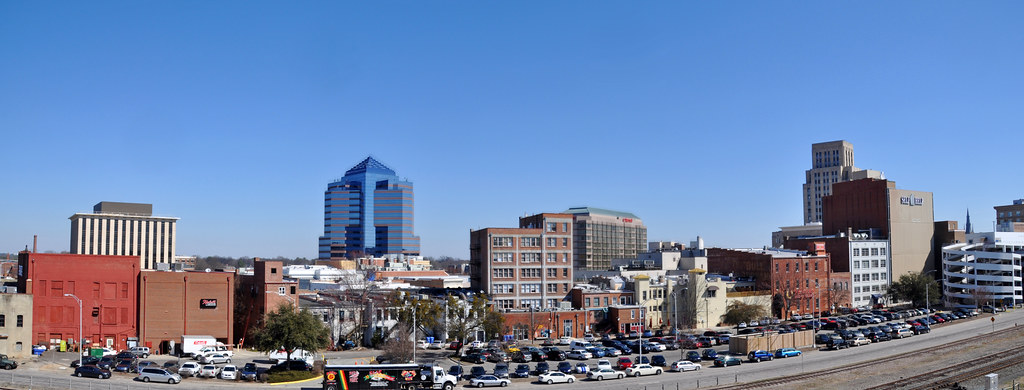Neighborhood College and the Top 10 Durham Tidbits
This past Fall, I was fortunate enough to be chosen for Durham Neighborhood College. Until recently, I had no idea this program existed and I imagine a lot of other Durham residents don't know about it.
The program is a joint effort between the City of Durham and Durham County. Participants meet once a week in the evening for seven weeks and get a glimpse into the goals, challenges, and initiatives that the city and county are undertaking, department by department.
The class sessions flew by and I learned more than I thought I would. Most importantly, I came away with a feeling that we are in good hands. The leaders that spoke are intelligent, diverse, and have a great understanding of the city's challenges, priorities, and opportunities. I don't think residents (me included) give Durham public officials enough credit.
Each session also provided time for questions from the participants (not just a few minutes either - we were able to dive into questions and concerns). My positive impression of the Durham leaders was matched by the insightful group of citizens asking fantastic questions. At the risk of coming across far too pollyannaish, I really did come away with a warm fuzzy feeling about Durham.
That said, I wanted to share a list of the top 10 interesting tidbits that came up during the class sessions. There was much more nuance and value of course, but these are the parts that I could turn into a top 10 list! I encourage you to apply for 2019 (info for this year hasn't been posted yet, but set a reminder to do a google search in the summer).
Without further ado, the top 10 tidbits from the course.
10. Cree is the single largest taxpayer in the City of Durham - Duke is a nonprofit and has tax exemptions and large companies in RTP that are within Durham County are mainly outside of the city of Durham.
9. Universal Pre-K is a major goal - the county has a approved a tax rate increase, but needs additional fundraising to make sure every pre-k aged child in Durham is covered, which would lead to kids better prepared for kindergarten (studies have shown that these preparedness makes a difference throughout the child's life), and more caregivers able to enter the workforce.
8. 34.5% of the county's budget goes to public schools (the largest single budget item) - In 2016, Bull City Rising did an amazing series on the public schools here. The amount of funding may not be the issue, but the allocation might be. I am not an expert and didn't think to ask if there have been any changes since Bull City Rising's series. Maybe that's something you can bring up at the next neighborhood college!
7. The Durham YouthWork Internship Program gives kids professional experience - the program is not just an internship, but an educational experience in building workplace skills, understanding the application and interview process, and generally being well-prepared for professional life. If you have kids, you can find out more here!
6. Durham wants to help small developers - the Planning Department and Economic Development Department seem to work well together. They are interested in growth and development that makes sense for Durham and keeps the profit/benefit local. They are helping small, local developers by reworking the complicated process (big developers have the advantage of having the time and resources to navigate these processes) and through outreach and relationship building with local developers. I think they could go a step further by encouraging more local developers to become active in Durham.
5. The county is creating a new role to address youth issues across departments - I think it's great that there will be someone dedicated to looking at Durham from a child's perspective when it comes to parks, economic development, and every other aspect of our county. Even better would be a similar role that represents the aging and disabled populations of our city!
4. Community Engagement is a priority - Historically, Durham, like many other cities, has not been great at getting input from citizens. Now, it seems Durham has made citizen input a priority. Durham is one of the only cities in the country to introduce Participatory Budgeting, where citizens directly vote on how a portion of the budget is spent. Durham even has its own Community Engagement division, part of the Neighborhood Improvement Services department. Community engagement seems like one of the most challenging tasks I can imagine. It's great to see that they are taking it seriously.
3. Durham is getting smarter and greener - there is an initiative in place to move government buildings to smart HVAC systems that can be more efficient and alert the city when they are in need of maintenance and repair. This will save the city money as well as increase energy efficiency.
2. Multi-modal transportation is important - we were told that every transportation infrastructure project going forward will consider bike and pedestrian accessibility. Durham is especially interested in becoming a more bikeable city, as demonstrated by the Bicycle Boulevards initiative moving forward.
1. Bull City United aims to reduce gun violence systemically - in addition to the police department's focus on gun violence, the Health and Human Services department has looked to the latest in research on effective interventions and preventions. They empower Bull City United, a group of amazing community members who live and work within the community to help gang culture and cultures of violence. It's important to address crime after the fact, but it's also crucial to address crime before it happens. Bull City United is one strong piece of that effort.


